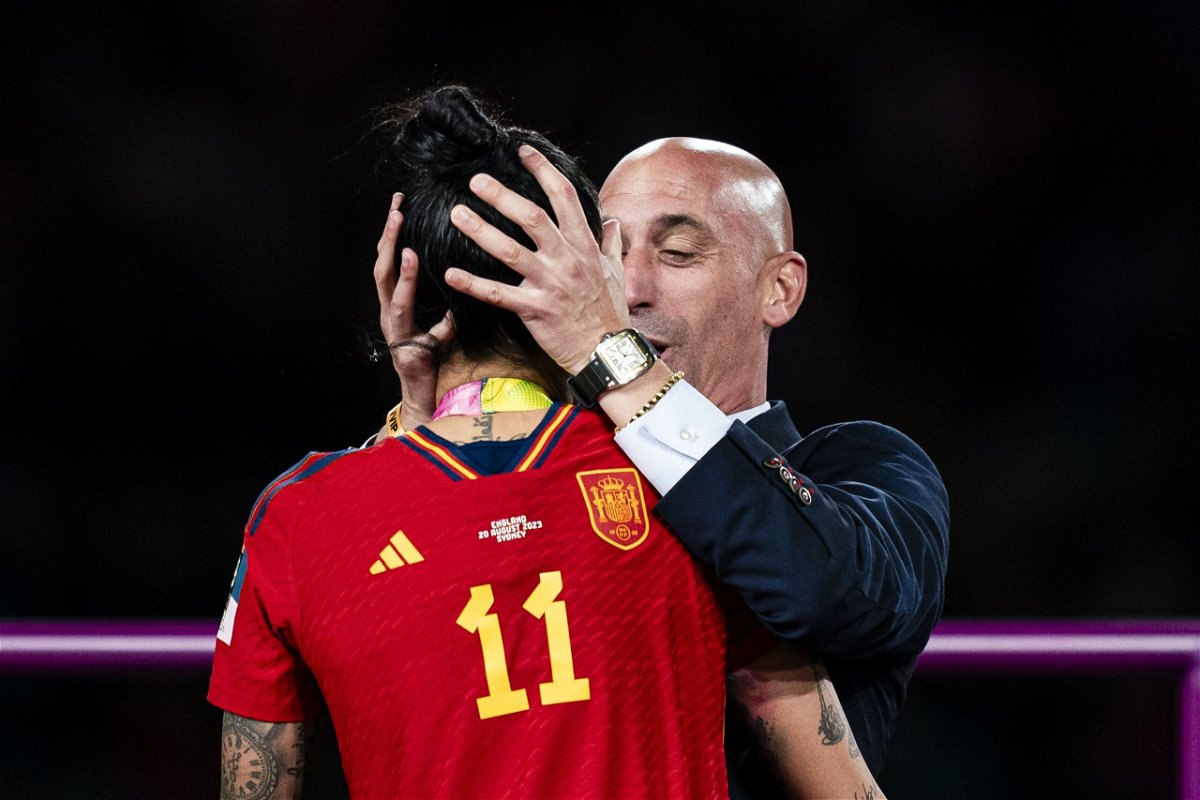The unwanted kiss that exposed the endurance of Spain’s macho culture

President of the Royal Spanish Football Federation Luis Rubiales (R) kisses Jennifer Hermoso of Spain (L) during the medal ceremony of FIFA Women's World Cup Australia & New Zealand 2023 Final match between Spain and England at Stadium Australia on August 20.
Analysis by Al Goodman, CNN
Madrid (CNN) — More than a week after Spain’s historic win over England in the Women’s World Cup final, there is little talk of soccer.
Instead, the victory has been overshadowed by an unwanted kiss that has sparked global outrage and put the spotlight on Spain’s enduring culture of machismo in many quarters, despite significant advances in equal rights in recent years.
Star player Jennifer Hermoso described the actions of Spanish soccer federation president Luis Rubiales as an “impulse-driven, sexist out of place act without any consent.” The 33-year-old veteran said she felt the “victim of an aggression,” one that took place in front of a packed stadium and a global television audience after her team’s hard-won 1-0 victory over England on August 20.
Hermoso’s teammates share her outrage, with all of them now refusing to play again for Spain until Rubiales quits or if removed.
Instead of continuing the celebration of a historic victory, a gesture that happened shortly after the match finished now has overshadowed the rest in Spain.
A day after the kiss, Rubiales said he had “made a mistake,” but since then has insisted that it was consensual.
But FIFA, the world’s governing body of soccer, has provisionally suspended him for 90 days from his federation job. The Spanish government has sent a complaint to Spain’s Sports Tribunal, in a step toward trying, at the least, to suspend Rubiales, who has refused to resign.
On Friday the scandal escalated further when Rubiales made a defiant speech at the soccer federation’s Extraordinary General Assembly, where he had been widely expected to stand down but instead said multiple times he would not. The members of the federation who haven’t quit since then are backing him and the federation threatened legal action against Hermoso, accusing her of lying,
A reminder of inequality
For Spaniards, the episode is a stark reminder that the country, for all of its advances towards women’s rights and equality in recent years, still has “macho” and “machismo” as a lifestyle for some. It rears up in cases of domestic violence that have left nearly 40 women dead in Spain this year. But more broadly, men are still in a power position in many activities and endeavors across the country, including at work.
“What happens here in this particular case, sends a strong message to all sports federations and to all women, girls and teenagers who are practicing sports either professionally or non-professionally,” Tania Verge Mestre, councillor for Equality and Feminisms in the Catalonia regional government, told CNN on Sunday.
She said Rubiales “needs to be dismissed,” along with those who didn’t hold him “accountable or condoned this behavior for a long time, not just during the World Cup.”
Verge Mestre, who’s based in Barcelona, added that the “sports federations – which are private associations – need to be forced to train on gender issues. All members of their boards, because they have to be able to identify these instances of not just sexual violence but also power abuse which is quite pervasive in professional sports.”
It is worth remembering that Spain ranks highly on women’s rights, ranking 19th out of 146 countries rated by the Global Gender Gap Index for 2023, having made measurable strides to close the gender gap.
The number of women on boards of directors is 32.4 percent, about 3.5% higher than in 2021, but still below the 40% target in a European directive for large listed firms, IESE, a leading business school in Spain, reported last March.
However, the country is also home to the far-right Vox party, now the third-largest force in parliament, and aims to use its growing influence, including in local and regional governments, to roll back decades of progress in women’s rights by blocking abortion access, repealing legislation on gender-based violence and shutting down the ministry of equality.
Recent years have seen mass protests against sexual abuse and violence, with the so-called “Wolf Pack” case – where a group of men who gang raped a woman were initially charged with sexual assault – a particular flashpoint.
For Spain’s women’s soccer team, there have been protests over lower pay than the men’s national team. And the women have pressed for better equipment, training facilities, and treatment.
What was harder to prepare for, it seems, was an unwanted kiss from the very top of Spain’s football federation, which threatens to turn the story of Spain’s World Cup victory from one of women’s talent and perseverance into a tale of all that is still wrong with the country’s treatment of women.
The-CNN-Wire
™ & © 2023 Cable News Network, Inc., a Warner Bros. Discovery Company. All rights reserved.